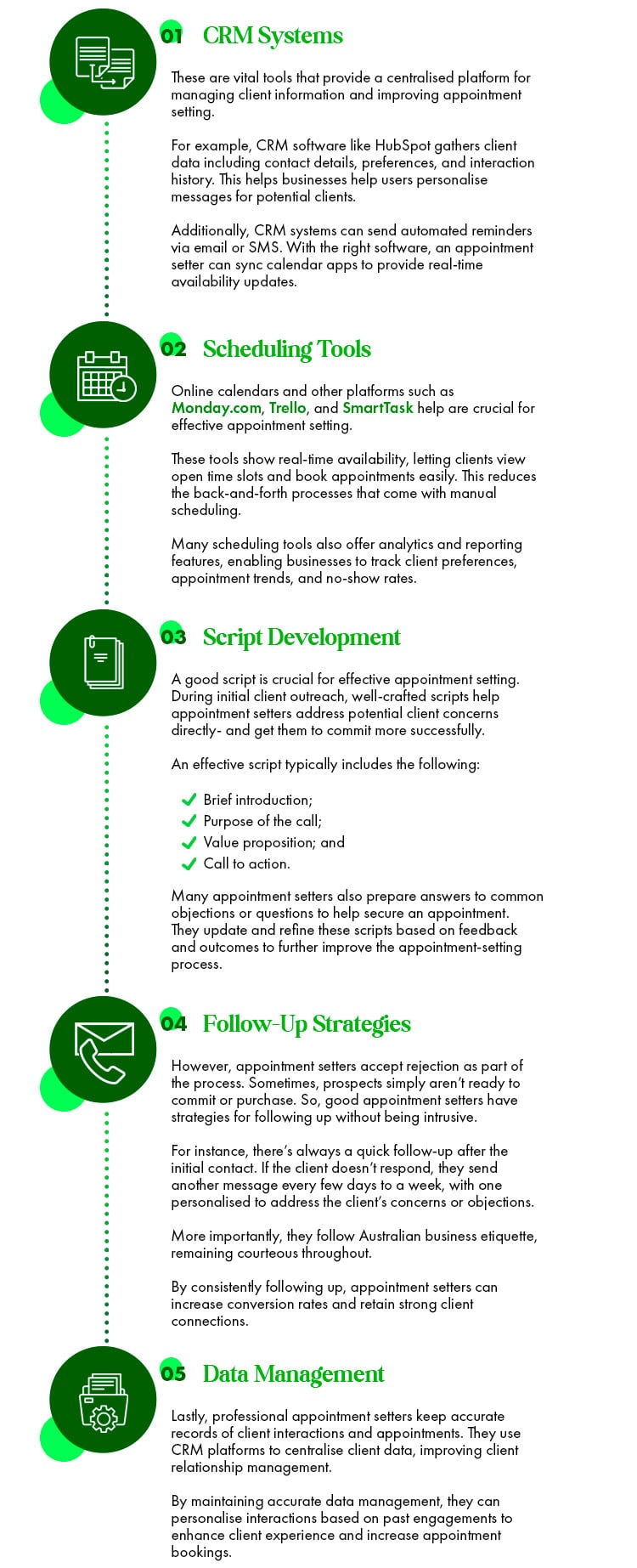Keeping track of meetings and appointments can be daunting. This is even more challenging if you’re juggling multiple tasks as your business grows.
Hence, many entrepreneurs delegate non-core functions like appointment setting to experienced and skilled professionals. They schedule meetings and set up calendars, allowing you to focus on other important matters.
In this article, we will provide a detailed guide on what an appointment setter is, how they can make your life just a little bit easier, and how they can potentially increase your bottom line.
What is an Appointment Setter?
An appointment setter is typically a professional who remotely handles appointments on behalf of a company or individual. Their primary responsibilities include:
- Reaching out to potential clients through phone calls and emails;
- Arranging appointments with existing customers;
- Coordinating appointments to match everyone’s availability; and
- Sharing the meeting’s purpose in advance.

The most experienced appointment setters typically have good communicable skills, persuasive demeanors, and strong organisational abilities. As such, they can enhance your company’s customer service and maximise sales impact further.
Key Skills for Appointment Setters
A good appointment setter takes over the grunt work of managing a busy schedule and making sure their clients don’t miss any important commitments. To make this happen, they rely on certain skills like:
Communication Skills
Appointment setters secure meetings by directly communicating with potential clients.
They need to be articulate and persuasive, requiring both a deep understanding of the product and active listening skills to convince a prospect about why the company’s product or service is the solution to their problem/s.
Moreover, an effective appointment setter knows how to tailor messages depending on the audience.
For example, when reaching out to a high-level executive, they’re likely to be more formal while cutting to the chase when highlighting strategic benefits. In contrast, they might deploy a more casual and conversational approach when dealing with potential customers.
Organisational Skills
Appointment setters oversee a detailed calendar of appointments to schedule meetings efficiently and to prevent conflicts.
Good organisational skills help them stay on top of everything so their clients don’t miss important appointments.
Additionally, strong organisational skills empower appointment setters to meet deadlines, maintain productivity, and provide quality service consistently.
Persistence and Patience
Handling rejections is par for the course, as not every prospect will express interest or agree to a meeting.
A persistent appointment setter, however, sees rejections as opportunities to improve their approach. They also exercise great patience, especially when dealing with prospective or new clients who take time (and strategic follow-ups) to cultivate.
Tech-Savviness
The most effective appointment setters are adept at using Customer Relationship Management (CRM) software and scheduling tools.
A tech-savvy appointment setter saves time and resources by using technology to
- Connect with a wider audience,
- Nurture leads through automated workflows, and
- Track engagement metrics to refine their approach over time.
This ability to use software and tools enhances productivity, improves client relations, and ultimately, increases appointment conversion rates.
The Importance of Appointment Setting
An appointment setter is an indispensable part of a growing business. They ensure a steady stream of potential clients and opportunities through:
Improved Efficiency
An appointment setter streamlines lead management and client engagement by handling the initial outreach to potential clients. This allows the sales team to focus on converting qualified leads rather than administrative tasks involved in the process.

For instance, an appointment setter can identify and contact potential clients on your company’s behalf. After gathering information about the client’s needs, they pass these on to the sales team, allowing them to tailor their presentation and address the client’s specific concerns.
This organised approach saves time, reduces administrative burdens, and maximizes client interactions.
Enhanced Client Relations
Appointment setters are your front line when building positive client relationships. Thus, they need to make a good first impression and show genuine interest in the client’s needs.
How?
First, they contact a prospect who has shown interest in the product or service. The setter then takes time to understand their needs and pain points, before scheduling a meeting at the client’s preferred time.
During the meeting, the appointment setter should provide a personalised pitch based on the client’s initial information. They then supplement this with consistent follow-ups and the timely scheduling of appointments to make their clients feel valued.
Time Management
Delegating appointment-setting tasks to skilled professionals helps business owners focus on other core business functions.
If you’re running a real estate agency, for instance, an appointment setter can schedule meetings with potential buyers for you. They also keep your agents’ calendars organised so that they don’t overlap.
Furthermore, they use scheduling software to automate reminders and confirmations. This saves time and helps maintain a smooth workflow for the entire business.
In short, appointment setters keep everyone organised to put everyone’s time, energy, and talents to optimal use.. This allows sales agents and business owners to focus on improving their products and services or building better client relationships – instead of going back and forth over their schedules themselves.
Increased Conversion Rates
Appointment setters use a structured approach to make each potential client feel like they’re getting attentive service while moving them smoothly through the sales funnel.
More importantly, they proactively follow up with prospects whom they weren’t able to close right away. This helps convert more leads since studies show that customers tend to say NO four times before saying YES.
This strategic engagement is more successful at turning initial rejections into successful conversions, leading to higher sales and improved business growth.
Pipeline Management
Done right, steady appointment setting provides a steady flow of qualified leads. A good setter fills the sales pipeline with prospects who have expressed their interest in your products or services.
Strategic appointment setting also involves segmenting leads based on their readiness to buy. This helps the sales team prioritise and focus on leads who are most likely to convert into sales.

In other words, appointment setters follow a systematic approach that drives lead generation, optimises resource allocation, and maintains consistent engagement with potential clients.
Appointment Setting in the Australian Context
Small businesses make up a large part of Australia’s economy. They’re 97% of the 2.6 million registered businesses.
Many of these businesses rely on appointment setters for the efficient scheduling of meetings, consultations, reservations, and service appointments. These professionals often have the experience and expertise to offer personalised attention to customers, regardless of the industry they serve.
In addition, appointment setting Down Under is often subject to the following considerations:
Cultural Nuances
Appointment setters must have a keen understanding of cultural nuances for successful interactions. Australians, for example, value clarity and directness. They also appreciate punctuality.
Thus, appointment setters for AU businesses should ideally be straightforward and transparent about the meeting’s purpose – and start the meeting on time. They’re prompt about sending email agendas with agreed-upon times, but are open to client rescheduling.
Regulatory Environment
Australia requires strict compliance with privacy laws. Businesses must obtain consent before collecting personal data from clients and customers. There are even Australian regulations in place to prohibit unsolicited messages.
Fortunately, professional appointment setters know their way around AU’s complex regulatory environments. Many have different ways of securing consent before collecting personal information, and informing prospects about opt-out options as required by AU laws.
Time Zones
Managing appointments across Australia’s three main time zones requires careful planning. To handle this, appointment setters use scheduling software that automatically adjusts to the recipients’ locations.
They also send confirmation emails with the appointment times within the customer’s time zone. This helps avoid misunderstandings and most importantly, prevents missed appointments.
AU Industries Where Appointment Setting Plays a Crucial Role
While appointment setting can be helpful to any business, there are certain industries where it’s downright crucial.
Healthcare
Aside from business owners and entrepreneurs, Australian medical professionals also tap professional appointment setters to help facilitate patient care.
These professionals use effective appointment systems integrated with electronic health records (EHR), allowing patients to:
- Book appointments online;
- Receive automated reminders; and
- Access pre-visit instructions.
This approach reduces no-show rates and enhances patient engagement and satisfaction.
Finance
Australia’s financial sector is heavily regulated by the Australian Securities and Investments Commission (ASIC). They require financial advisors and consultants to keep clients well-informed about the details and the agenda of each meeting.
This is where appointment setters come in. With their experience and expertise, they coordinate appointments based on their advisors’ availability and client preferences.
By offering prompt service, appointment setters enhance the client experience, and by extension, the advisor in question’s reputation.
Real Estate
Many real estate companies also rely on appointment setters to coordinate property viewings and client meetings.
They liaise between agents and clients, scheduling appointments and facilitating communication to accommodate both parties’ schedules. They also offer clients a range of available viewing times and send reminders to minimise no-shows.
By sending detailed confirmations and reminders, appointment setters help real estate companies give positive client experiences. This, in turn, can expedite property and purchase processes.
Legal
Lawyers and legal professionals need appointment setters to manage client meetings, court appearances, and other legal proceedings.
Appointment setters coordinate complex schedules between attorneys, clients, witnesses, and court officials. For instance, they inform all parties about the time, location, and purpose of important meetings or court appearances.
With effective appointment setting, law firms can provide timely and effective legal services within the AU legal system.
Travel and Hospitality
Meanwhile, travel agencies and hotels rely heavily on appointment setters to manage customer interactions and operational logistics.
A professional appointment setter, for instance, schedules consultations with clients regarding travel plans and itineraries. They can also help hotels manage reservations during peak seasons to maximise occupancy rates.
In both instances, proper appointment setting is necessary for businesses to remain competitive in the travel and hospitality industries.
Beauty and Wellness
Lastly, aesthetic clinics and wellness centers rely heavily on efficient appointment setting to coordinate client visits.
They let customers know about available appointment times for haircuts, massages, or facials. Appointment setters also send out reminders to reduce the chances of customers missing appointments, which is crucial especially during peak season.
Aside from scheduling, appointment setters also maintain accurate records of client appointments, preferences, and treatment histories. This improves customer satisfaction and, in turn, boosts overall business profitability in a highly competitive industry.
Tools and Techniques for Effective Appointment Setting
Appointment setters use several tools to streamline the scheduling process. They also rely on certain techniques to reduce no-shows.
Let’s take a look at some of them:
CRM Systems
These are vital tools that provide a centralised platform for managing client information and improving appointment setting.
For example, CRM software like HubSpot gathers client data including contact details, preferences, and interaction history. This helps businesses help users personalise messages for potential clients.
Additionally, CRM systems can send automated reminders via email or SMS. With the right software, an appointment setter can sync calendar apps to provide real-time availability updates.
Scheduling Tools
Online calendars and other platforms such as Monday.com, Trello, and SmartTask help are crucial for effective appointment setting.
These tools show real-time availability, letting clients view open time slots and book appointments easily. This reduces the back-and-forth processes that come with manual scheduling.
Many scheduling tools also offer analytics and reporting features, enabling businesses to track client preferences, appointment trends, and no-show rates.
Script Development
A good script is crucial for effective appointment setting. During initial client outreach, well-crafted scripts help appointment setters address potential client concerns directly- and get them to commit more successfully.
An effective script typically includes the following:
- Brief introduction;
- Purpose of the call;
- Value proposition; and
- Call to action.
Many appointment setters also prepare answers to common objections or questions to help secure an appointment. They update and refine these scripts based on feedback and outcomes to further improve the appointment-setting process.
Follow-Up Strategies
However, appointment setters accept rejection as part of the process. Sometimes, prospects simply aren’t ready to commit or purchase. So, good appointment setters have strategies for following up without being intrusive.
For instance, there’s always a quick follow-up after the initial contact. If the client doesn’t respond, they send another message every few days to a week, with one personalised to address the client’s concerns or objections.
More importantly, they follow Australian business etiquette, remaining courteous throughout.
By consistently following up, appointment setters can increase conversion rates and retain strong client connections.
Data Management
Lastly, professional appointment setters keep accurate records of client interactions and appointments. They use CRM platforms to centralise client data, improving client relationship management.
By maintaining accurate data management, they can personalise interactions based on past engagements to enhance client experience and increase appointment bookings.

Challenges and Solutions in Appointment Setting
Getting clients to make and commit to appointments can be tough. Here are some common challenges and how hiring the right professionals can help you overcome them:
High Rejection Rates
Appointment setting is challenging due to high rejection rates from potential clients. Many customers may decline due to lack of interest or just plain old bad timing.
So, how can a professional appointment setter help? Here are a just a few ways they can lower your rejection rates:
- Refine and personalise scripts to make the benefits of your product or service more appealing;
- Use data analytics from CRM systems to provide insights into client preferences; and
- Offer flexible scheduling options.
Done right, well-trained and highly-experienced appointment setters use these strategies to lower rejection rates, boost appointment success, and improve client acquisition and retention.

No-Shows
Appointment setters also have to deal with no-shows. Left unchecked, these can disrupt schedules, waste resources, and affect client satisfaction.
Trained professionals can significantly reduce no-shows by:
- Implementing automated appointment reminders via email or SMS;
- Sending messages after booking to solidify commitment;
- Offering scheduling flexibility; and
- Establishing clear cancellation policies.
These strategies help businesses streamline their appointment setting for higher client satisfaction and attendance rates.
Coordination Issues
Managing multiple schedules and handling last-minute changes can be stressful.
For example, managing appointments in the healthcare industry is challenging due to their high volume. To address this, appointment setters typically:
- Use CRM systems with integrated calendar functionalities for real-time updates;
- Confirm appointments and provide clear instructions to mitigate misunderstandings;
- Ensure all parties are informed and prepared; and
- Establish contingency plans or backup resources for unexpected cancellations.
These solutions improve the client experience and enhance coordination efforts. Furthermore, the following strategies are also helpful:
Training and Development
Appointment setters are your company’s frontline representatives, so you should train them to behave in a way to engage your target audience better.

For instance, role-playing exercises provide practical experience to help them refine their approaches in different scenarios. It’s also helpful to have additional training for advanced scheduling tools and CRM systems.
Technology Integration
New technologies can disrupt workflows if you don’t break them in properly, so you need to prepare your staff accordingly.
When implementing new software, it’s best to provide adequate training for your appointment setter/s beforehand. This allows them to familiarise themselves with the tool and understand its functionalities.
Proactively involving them in the transition process gives them a sense of ownership and equips them with readiness to embrace changes.
Feedback Mechanism
Implementing effective feedback mechanisms can significantly improve the appointment-setting process. It allows you to gather insights from both clients and internal stakeholders.
To do this, collect feedback from clients through surveys, post-appointment follow-ups, or direct conversations. Moreover, solicit feedback from your own staff to identify any training gaps and opportunities for streamlining workflows.

This proactive approach helps foster a culture of continuous improvement, allowing your business to adapt to evolving client and industry demands.
Conclusion
Appointment setting can be challenging on your own, but you can get better results with far less stress if you delegate it to professionals.
The right ones can provide various appointment-setting benefits like lead generation, customised solutions, and enhanced customer engagement. This frees you up to focus on your core functions and grow your business faster.
Maintain a growing customer pipeline and build a more stable business by delegating appointment setting to a professional today!
Want to streamline your business operations? Check out these 100 AI prompts.
Looking for world-class remote workers to join your team? Click here.
Experience the advantages of a top global team and check out our 1,000 fully vetted and highly talented staff here.
Syrine is studying law while working as a content writer. When she’s not writing or studying, she engages in tutoring, events planning, and social media browsing. In 2021, she published her book, Stellar Thoughts.




















